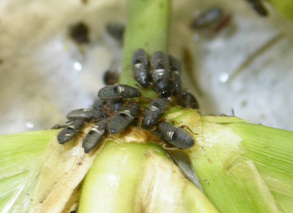Chinch BugsJune Pest of the Month.

If you've seen our trucks around town, then you already know what we're going to say
"Give a Chinch an inch and they'll take your yard!"
What are Chinch Bugs & what causes them?
Chinch bugs are small black and white insects that feed on the sap of grass thatch. These pests can create devastating lawn problems in the North Central Florida area. While these chinch bugs suck plant juices they inject chemicals into the plant which in turn clogs the plants vascular system. It is reported from the University of Florida that the Chinch Bug causes millions of dollars in damages each year. (photo to the left courtesy of: Agrilife Today on Flickr)
Jump to section: Appearance | Symptoms | Habitat | Treatment | More Information
General Appearance
Chinch bugs have piercing-sucking mouthparts. They spend their time in the winter protecting themselves and resurface in the spring when the weather warms up.
Normally Chinch bugs are active from March through November in North Central Florida. These insects can be active year round in South Florida.
- Chinch bugs are black in color and range in length from 1/8" - 1/10".
- Their wings are flat on their back and shiny white with a triangle-shaped black marking in the middle of the outer edge of each wing.
- Adult Chinch bugs can have short or long wings.
- They are most active on sunny days in the mid-afternoon when it's the warmest.
- Females can live up to 2 months and can lay up to 300 eggs in their lifetime.
- Eggs of Chinch bugs are small, oval shaped and have 4 projections that extend outward one side.
- New eggs are white in color, then turn amber color and lastly turn red before they hatch.
Also listen to recorded radio interviews with Roy Crain Jr. discussing this month's pest.
Symptoms
Often times, around the area of the plant that the Chinch bug fed on will turn yellow. At first damaged areas will appear small and irregular until this pest spreads outward throughout the lawn. Then these patches will get bigger overtime as they feed even more and turn reddish-brown like rust and then will eventually die.
Most of the time damages will begin to appear around June.
If you want a neat way to detect Chinch bugs try removing both ends of a tin can (such as coffee can or vegetable cans). Soften the soil with water in an area you think might be infected and insert one end of the can into the ground at least 2 inches. Fill the remaining end of the can with water and wait for these pests to appear. It may take about 5 minutes before they appear and will float to the surface letting you know if you have a chinch bug infestation. Tip courtesy of: http://www.uri.edu/ce/factsheets/sheets/chinchbug.html
We have several Chinch Bug treatment options to choose from; give us a call today at (386) 362-3887 if you are experiencing an infestation and to discuss treatment options.
Habitat
- Chinch bugs live in the thatch area of the turfgrass and prefer to feed on the lower leaf sheath and crown area of the pant. They tend to stay together in an area and will feed on the same plant at the same time. Once they kill the turfgrass or the plant they were feeding on they will move over to another section of the lawn.
- They are most damaging in open, sunny areas found often near driveways and sidewalks. They have also been spotted in the middle of lawns.
- Chinch bugs prefer to feed on different types of St. Augustine grass. They will also feed on Bermuda grass, bahia grass, centipede grass, zoysiagrass.
Treatment
During this time of year yellow spots may start appearing in turfgrass. If you see yellow spotting it is important to call a Pest Specialist to come out and assess the lawn for Chinch Bugs or other causes. In just a day or two Chinch Bug damage, yellow spotting can go from the size of a basketball to the size of a truck.
Live Oak Pest Control has developed a great method of eliminating and downsizing the population for Chinch bugs. If you believe you are experiencing a Chinch bug problem in your lawn give us a call today at (386) 362-3887 and we'll send out a lawn care specialist to evaluate the problem.
Listen to recorded radio interviews with Roy Crain Jr. discussing this month's pest.
More Information
- Southern Chinch Bug : University of Florida IFAS Extentsion
- Chinch Bugs : University of Rhode Island Landscape Horticulture Program
